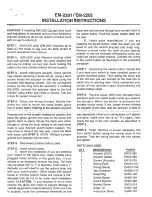
Run-flat tires
Safety information
Warning
The vehicle handles differently when a
run-flat tire has insufficient or no tire
pressure; for instance, reduced lane stabil-
ity when braking, braking distances are
longer and the self-steering properties will
change. There is a risk of accident. Drive
moderately and do not exceed a speed of
50 mph/80 km/h.
Maximum speed
You may continue driving with a damaged
tire at speeds up to 50 mph/80 km/h.
Continued driving with a flat tire
If continuing to drive with a damaged tire:
1.
Avoid sudden braking and steering ma-
neuvers.
2.
Do not exceed a speed of
50 mph/80 km/h.
3.
Check the tire inflation pressure in all
four tires at the next opportunity.
If the tire inflation pressure in all four
tires is correct, the Tire Pressure Moni-
tor may not have been reset. In this
case, perform the reset.
Possible driving range with a
depressurized tire
The distance for which it may be possible to
drive safely varies depending on how the
vehicle is loaded and used, e.g., speed, road
conditions, external temperature. The driv-
ing range may be less but may also be more
if an economical driving style is used.
If the vehicle is loaded with an average
weight and used under favorable conditions,
the distance for which it may be safe to
drive may be up to 50 miles/80 km.
Vehicle handling with damaged tires
Vehicles driven with a damaged tire will
handle differently, potentially leading to
conditions such as the following:
–
Greater likelihood of swerving off
course.
–
Longer braking distances.
–
Changed self-steering properties.
Modify your driving style. Avoid abrupt
steering maneuvers or driving over obsta-
cles, for instance curbs or potholes.
Final tire failure
Vibrations or loud noises while driving can
indicate the final failure of a tire.
Reduce speed and stop; otherwise, pieces of
the tire could come loose and cause an acci-
dent.
Do not continue driving. Contact a dealer’s
service center or another qualified service
center or repair shop.
System limits
Temperature
The tire inflation pressure depends on the
tire's temperature.
Driving or exposure to the sun will increase
the tire's temperature, thus increasing the
tire inflation pressure.
The tire inflation pressure is reduced when
the tire temperature falls again.
These circumstances may cause a warning
when temperatures fall very sharply.
Sudden tire pressure loss
The system cannot indicate sudden serious
tire damage caused by external circumstan-
ces.
Seite 148
CONTROLS
Safety
148
Online Edition for Part no. 01405A02680 - II/20
Summary of Contents for COOPER SE
Page 1: ...OWNER S MANUAL MINI COOPER SE LINK CONTENT A Z Online Edition for Part no 01405A02680 II 20...
Page 2: ...Online Edition for Part no 01405A02680 II 20...
Page 15: ...Information NOTES 15 Online Edition for Part no 01405A02680 II 20...
Page 31: ...On the road QUICK REFERENCE 31 Online Edition for Part no 01405A02680 II 20...
Page 207: ...Cargo area CONTROLS 207 Online Edition for Part no 01405A02680 II 20...
Page 217: ...Increasing range DRIVING TIPS 217 Online Edition for Part no 01405A02680 II 20...
Page 267: ...Care MOBILITY 267 Online Edition for Part no 01405A02680 II 20...
Page 271: ...Appendix REFERENCE 271 Online Edition for Part no 01405A02680 II 20...
Page 284: ...01405A02680 ue BL5A0268000Z...
















































